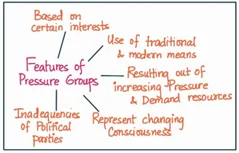Answer:
| Approach:
Introduction
- Introduce the concept of pressure groups and their role in the Indian political process.
Body
- Discuss the factors contributing to the growing influence of informal pressure groups.
- Mention examples of informal pressure groups gaining prominence.
Conclusion
- Conclude, emphasizing the complementary roles both types of pressure groups play in ensuring a vibrant democracy and diverse representation in policy-making.
|
Introduction:
Pressure groups are vital to the Indian political process, influencing decisions, shaping public opinion, and advocating for specific causes. Formal pressure groups are structured entities, such as trade unions and NGOs, while informal pressure groups are more loosely organized, including social movements and online communities. Both types of pressure groups contribute to a vibrant democracy by ensuring diverse voices are heard in policy-making.

Body:
There has been a growing perception that informal pressure groups have emerged as powerful as formal pressure groups in recent years.
This view can be attributed to the following factors:
- Increased access to information: With the rise of the internet and social media, informal pressure groups can easily disseminate information and mobilize public support for their cause.
- Media attention: Informal pressure groups often receive significant media attention, which can pressure politicians and policymakers to address their concerns.
- Spontaneity and flexibility: Informal pressure groups can respond quickly to emerging issues and adapt their strategies as needed.
Examples of informal pressure groups gaining prominence in recent years include:
- Anti-corruption movement (India Against Corruption): Led by social activist Anna Hazare in 2011, this informal pressure group demanded the enactment of the Jan Lokpal Bill to address corruption. The movement garnered widespread public support and played a crucial role in the formation of the Aam Aadmi Party (AAP).
- Farmers’ protests: The ongoing farmers’ protests in India, which began in 2020, are an example of an informal pressure group coming together to challenge the central government’s farm laws. The protests have gained national and international attention, pressuring the government to engage in dialogue with the farmers.
Conclusion:
Despite the growing influence of informal pressure groups, it is essential not to undermine the importance of formal pressure groups, which continue to play a crucial role in the Indian political process. Both types of pressure groups contribute to a vibrant democracy by ensuring that diverse voices are heard and considered in the policy-making process.
